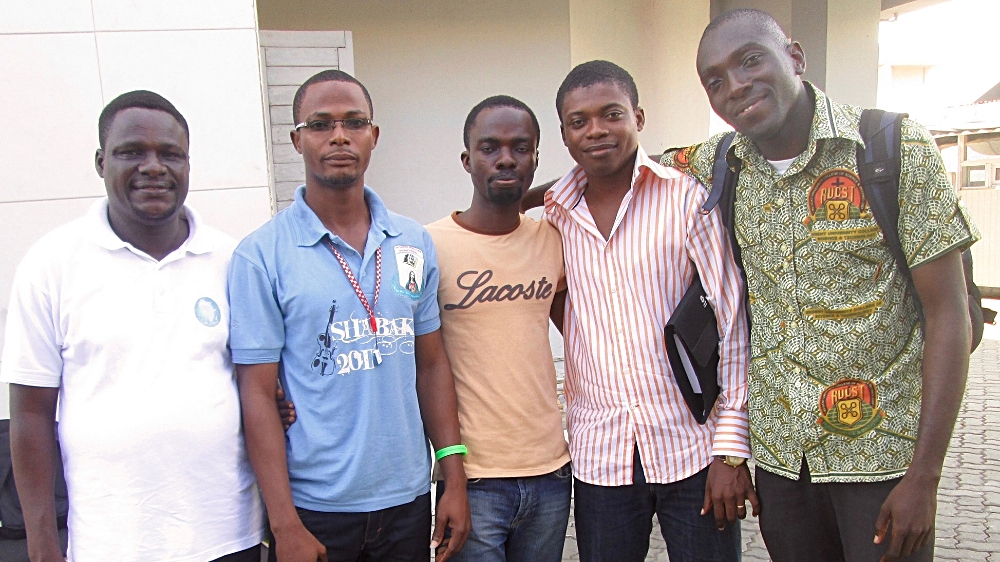Two notions of leadership come to mind as I reflect on the letter ‘J’ in my leadership alphabet. Some pursue leadership as a competition to the top of a social ladder. Leaders who employ this technique ruthlessly trample on others in total disregard as long as it offers an advantage in the race to the top. The focus is ‘me’ and ‘my’ recognition. They do get to the top and achieve the twofold goal — a big check and an impressive title. However, they soon realize that it is lonely at the top and back home even their children hate them. In a nutshell, they find no friends, remain miserable and resent the fact that people do not care about their accomplishments.
The second notion sees leadership as a privilege; leaders have the opportunity to lead on a journey to the top. They make decisions that harness cohesion, celebrate success and support members as they endeavor to give their best. These leaders galvanize others to perform in their strongest capacity, correct errors graciously and reach the top as a team success. Imagine such leader raised up by the team with full celebration, splashes of expensive drinks and loud cheers of excitement. For these leaders, the top is not lonely because they empowered others along the journey.
‘J’ is for Justice
The litigious culture of North America associates justice with jurisprudence or legal determination of right and wrong. It is indisputable that the rule of law is crucial for harmonious social order. Here, justice carries the ordinary sense to be fair and impartial in matters of human interaction, compensation or conflict management. A just leader reduces anxiety and fosters calm assurance for minorities — be it race, gender or religious minorities.
Too many leaders choose silence and inaction, allowing others to suffer on their watch. Silence in the face of injustice is consent for unjust acts. A first-hand witness of injustice, Dietrich Bonhoeffer, once said ‘silence in the face of evil is evil itself.’ Just leaders assign responsibility where it belongs. They resist evil impulses to scapegoat the person by whom they feel intimidated or the weak link in their team. Under such leaders, bullies and bigots notice boundaries quickly and treat their fellow workers with respect. Just leaders naturally cultivate a culture of decency and respect. Conversely, cowards and the conscienceless seek to please those they fear and those whose favor they crave, even at the expense of the weak and marginalized.
Slogans and speech are not enough. Leaders must intentionally discourage nepotism, racism, and partisanship. Learn to be fair and just, and people will trust you as a leader. Socrates offered wise counsel when he said, “nothing is to be preferred before justice.”
‘J’ is for Journey
A pattern observed among young leaders in America has been particularly instructive and disheartening. Rugged individualism and a false sense of confidence at new positions too often drive fruitless ventures. These leaders like to erase the successful accomplishments of their predecessors and even verbally articulate their desire to change everything for the better. They fail to consider that the organization existed before them and will continue after them. Obsession with self-interest ignores the fact that the people they lead were there before they came along and will be there after they leave.
If you are not a pioneer, then you joined an institution on a journey from small successes to more significant accomplishments. This journey maintains a specific legacy and ethos and includes people whose life stories are wrapped around the slow progress of the organization. Naïve leaders fail to recognize the gradual growth process that goes along with people and institutional memories. They think people are only interested in them and are eager to jump on board with their idea of change.
Also, leadership is organic and follows a continuum in self-development and advancement. Most of us lead differently after years in our roles compared to our first month. The ‘journey’ mindset creates self-awareness that recognizes legacies, ethos and a public image to maintain. Humility and appreciation for the contributions of previous leaders helps to locate your place in the journey. Pressing forward exposes leaders to new terrains, fears, and solutions for progress. Appreciate and cultivate changes consistent with the institutional ethos, and you will leave a mark when you pass the baton.
‘J’ is for Judgment
The ability to make right decisions and evaluate performance fairly distinguishes good leaders from bad ones. Judgment is determining what is right or wrong. It is decision-making that is rooted in justice. In leadership, differentiating the good from the bad, the useful from the useless and the laborious from the lazy may lead to condemnation and commendation. This is not an easy task. It may require delivering bad news to nice but incompetent people in your team. It may also mean having an obligation to expose a friend who violates the rights of others or breaks the laws of the land. As a sage puts it, “it is not good to show partiality to the wicked or to overthrow the righteous in judgment” (Prov. 18:5).
To be fair is to be prepared to address wrongdoing despite status or your relationship with the wrongdoer. The ancient Greek cardinal virtues of courage and prudence are imperative in this regard. No excuse suffices. Good judgment affects persons, productivity, and progress at every level. Dare to cultivate the spirit of fairness and a safe environment for the vulnerable. Resist the mantra of ‘those who you know determine your height on the ladder of promotion.’ You will find joy in knowing that people consider you trustworthy. In the world of race relations, I have learned that the greatest trepidation is exposure to the office of an unfair manager or boss. Good judgment is your most valuable currency as a leader. Work at it, intentionally practice it and ask God to reveal your blind spots to you so that you may grow.
‘J’ is for Journal
Ordinary journaling is a diary of self-reflection of personal experiences of the day. Conversely, the leader’s journal comprises a notation of innovative ideas, reminders, and suggestions worthy of consideration. What you deem important to remember and revisit has much to do with your sense of direction. You may not write or make mental notes of the obvious. If it is a ‘Google search’ away or easy to access then it is not valuable enough for a place in your leadership journal. Ideas are very expensive. Cherish and preserve them lest you forget. They come in places you least expect — on the toilet, while driving, in dreams, while playing with children, etc. I use a small notebook in my pocket or on my phone. Others use voice recordings. You can use whatever works for you. I use my phone to take pictures of objects I was looking at when some big idea occurred to me. On a few occasions, I decided to journal my thought progression on specific ideas as they occur, and I am often surprised about the wealth of ideas in the end. Journaling is intentional documentation. It could be in the form of writing, memory or photography. The best way to file ideas is the one that works best for you. Embrace those rich ideas that visit you in rugged clothes, store them, and you may discover the gem in your journal.
‘J’ is for Jubilation
There is a time to work and a time to play. Team cohesion can be enhanced by a short trip for appropriate adventure, a family picnic or celebrations of success. Gone are the days when leaders are known to be buttoned up, serious looking, and cultivate a persona to be feared. The twenty-first-century leader is not a boss but a facilitator of talents — a human working with fellow human beings with real human needs. Take advantage of an anniversary to create opportunities for fun, laughter and more intimate connections. We now know that emotional intelligence is as important as the intelligent quotient (IQ). Trust develops in the space of fun, casual and vulnerable interactions. Imagine that once a year top leaders in your team could be toasted by lower ranking members as a tradition of your company. What about the opportunity for leaders to grill for and serve team members as a tradition? Do not take yourself too seriously if you want to be a leader who connects with your team socially and emotionally. Break the walls down and let them know about your fears. Vulnerability is not a sign of weakness. Sometimes it reveals the heart of a compassionate leader.
Society and social media are driving home important dimensions of leadership. Leaders can no longer hide or exploit without notice. Unjust and unfair leaders will be exposed. Learn to enjoy space with the people God has entrusted to your leadership. Whether you lead at home, school or work, treat people how you would like to be treated. Today you may be strong but tomorrow you could be weak with age or sickness. Nothing is as rewarding as leaving traces of virtues and legacies of empowerment at every place you serve. I close with the words of the Apostle Paul: “be diligent in these matters; give yourself wholly to them, so that everyone may see your progress” (1 Tim 4:15).






